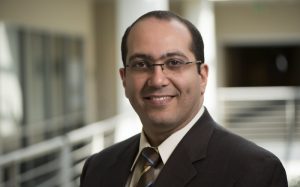Youssef Farag was laser-focused on one thing: getting his PhD in epidemiology as quickly as possible. But his adviser, Eliseo Guallar, MD, DrPH, MPH, had other ideas.
“Your success here is not tied to how fast you finish the doctoral program,” Farag remembers Guallar telling him. “It’s about what else you do during this time that will make you successful.”

Farag, MD, SPH ’13 (MPH), ’18 (PhD), an accomplished physician with a medical degree from Mansoura University in Egypt and a postdoctoral fellowship from Harvard University, was astounded.
“Okay, enlighten me,” he replied.
Guallar insisted that Farag avail himself of all the Johns Hopkins Bloomberg School of Public Health had to offer by engaging with faculty inside and outside of his program, investigating the wide-ranging slate of programs and seminars, and working with other students. Farag should prepare broadly and deeply, Guallar said, in order to become a leader in his field of methodological epidemiology. Each opportunity he chose should build his CV in a way that would distinguish himself from his peers.
Farag could not have embraced Guallar’s “make the most of it” approach without the financial support of doctoral scholarships and other funding. In addition to receiving the Samet Fellowship and the Alexander Langmuir Award Fellowship, Epidemiology chair David Celentano, SPH ’75 (MHS), ’77 (ScD), and others helped him identify research grants and teaching assistant positions.
“Having the financial freedom to pursue academic and service opportunities significantly contributed to my professional maturity and scientific thinking. It is beyond believable,” Farag says.
That financial freedom no doubt contributed to a successful defense of his thesis in epidemiological methods and study designs, setting the groundwork for his wide-ranging expertise in the subject. Today, Farag’s research prioritizes generating epidemiologic data on cardio-metabolic diseases for developing countries with poor research infrastructure.
Farag’s career is one PhD students dream about, with dual tracks in industry and academia. Previously medical director of clinical development at Akebia Therapeutics Inc., where he led the clinical development program of an investigational drug for anemia associated with chronic kidney disease, he is now the senior medical director of translational and clinical development at biotech firm Goldfinch Bio, Inc. And he just published two papers in the New England Journal of Medicine. (Both covered clinical trials that used the 2019 Nobel-winning hypoxia-sensing pathway work of JHU School of Medicine Professor Gregg Semenza, MD, PhD.)
One of Farag’s true pleasures is turning students on to epidemiology and statistics, and he enjoys a mosaic of roles that bridge teaching students and their instructors. At the Bloomberg School, he is an associate faculty member for the Department of Epidemiology and serves as a career mentor. Farther afield, he assists with Harvard Medical School’s collaborative effort with Egypt’s Ministry of Health, which seeks to train 7,000 Egyptian doctors in clinical research methods and medical education pedagogy over the next four years.
Read the full story on the Bloomberg School of Public Health’s website.
Topics: Bloomberg School of Public Health, Support Scholars